Second Round: A Return to the Ur-Bar Read online
Second Round
A Return to the Ur-Bar
Other Anthologies Edited by:
Patricia Bray & Joshua Palmatier
After Hours: Tales from the Ur-Bar
The Modern Fae’s Guide to Surviving Humanity
Clockwork Universe: Steampunk vs Aliens
Temporally Out of Order
Alien Artifacts
Were-
All Hail Our Robot Conquerors!
Second Round: A Return to the Ur-Bar
S.C. Butler & Joshua Palmatier
Submerged
Guilds & Glaives
Laura Anne Gilman & Kat Richardson
The Death of All Things
Troy Carrol Bucher & Joshua Palmatier
The Razor’s Edge
Second Round
A Return to the Ur-Bar
Edited by
Patricia Bray
&
Joshua Palmatier
Zombies Need Brains LLC
www.zombiesneedbrains.com
Copyright © 2018 Patricia Bray, Joshua Palmatier, and
Zombies Need Brains LLC
All Rights Reserved
Interior Design (ebook): April Steenburgh
Interior Design (print): ZNB Design
Cover Design by ZNB Design
Cover Art “Second Round” by Justin Adams of Varia Studios
ZNB Book Collectors #11
All characters and events in this book are fictitious.
All resemblance to persons living or dead is coincidental.
The scanning, uploading, and distribution of this book via the Internet or any other means without the permission of the publisher is illegal and punishable by law. Please purchase only authorized electronic editions of this book, and do not participate or encourage electronic piracy of copyrighted material.
Kickstarter Edition Printing, August 2018
First Printing, September 2018
Print ISBN-10: 1940709180
Print ISBN-13: 978-1940709185
Ebook ISBN-10: 1940709199
Ebook ISBN-13: 978-1940709192
Printed in the U.S.A.
COPYRIGHTS
Introduction copyright © 2018 by Patricia Bray
“Honorbound” copyright © 2018 by Russ Nickel
“Forest Law, Wild and True” copyright © 2018 by Rachel Atwood
“The Wizard King” copyright © 2018 by K.L. Maund
“A Favor for Lord Bai” copyright © 2018 by Jean Marie Ward
“A Lawman, an Outlaw, and a Gambler Walk Into a Bar…” copyright © 2018 by Jeanne Cook
“Make Me Immortal With a Kiss” copyright © 2018 by Jacey Bedford
“Bound By Mortal Chains No More” copyright © 2018 by William Leisner
“Welcome to the Jungle Bar” copyright © 2018 by Garth Nix
“But If You Try Sometimes” copyright © 2018 by Diana Pharaoh Francis
“The Whispering Voice” copyright © 2018 by David Keener
“Ale for Humanity” copyright © 2018 by Mike Marcus
“West Side Ghost Story” copyright © 2018 by Kristine Smith
“Thievery Bar None” copyright © 2018 by Aaron Michael Roth
“Wanderlust” copyright © 2018 by Juliet E. McKenna
Table of Contents
Introduction by Patricia Bray
“Honorbound” by R.K. Nickel
“Forest Law, Wild and True”
by Rachel Atwood
“The Wizard King” by Kari Sperring
“A Favor for Lord Bai”
by Jean Marie Ward
“A Lawman, an Outlaw, and a Gambler Walk Into a Bar …” by Gini Koch (writing as A.E. Stanton)
“Make Me Immortal With a Kiss”
by Jacey Bedford
“Bound By Mortal Chains No More”
by William Leisner
“Welcome to the Jungle Bar”
by Garth Nix
“But If You Try Sometimes”
by Diana Pharaoh Francis
“The Whispering Voice”
by David Keener
“Ale for Humanity” by Mike Marcus
“West Side Ghost Story”
by Kristine Smith
“Thievery Bar None” by Aaron M. Roth
“Wanderlust” by Juliet E. McKenna
About the Authors
About the Editors
Acknowledgments
Introduction
Patricia Bray
They say you can’t go home again. But you can return to your favorite bar, the place where the bartender knows your favorite poison and the regulars know you by name. In that spirit we are pleased to present a brand-new collection of stories set in the Ur-Bar.
Back in 2010 a group of science fiction authors came up with the idea for an anthology of stories set in a bar. Not just any bar—the Ur-Bar, the ultimate watering hole. At any time throughout history, there is always one place that is closest to the ideal of what a bar should be. That place is the Ur-Bar, where you’ll find the immortal Gilgamesh pouring local beverages and the occasional mystic potion.
Unlike most ideas that authors have while drinking at science fiction conventions, this still seemed like a good idea in the light of day. Tekno Books and DAW agreed and AFTER HOURS: TALES FROM THE UR-BAR was released in 2011.
The first anthology set the tone for future projects, containing a variety of stories from humor to horror, and mixing bestselling authors with those seeing their print debut. Joshua Palmatier and I had so much fun with this project, in 2012 we followed it up with THE MODERN FAE’S GUIDE TO SURVIVING HUMANITY, also published with Tekno Books and DAW.
When Tekno Books scaled back their operations, Joshua Palmatier took the next leap forward, founding Zombies Need Brains, a small-press publishing original genre fiction anthologies. The first release from ZNB was CLOCKWORK UNIVERSE: STEAMPUNK VS ALIENS. This was quickly followed by a half-dozen other projects, with a wide variety of themes, from temporally malfunctioning objects to aliens, were-creatures to robot invaders, life under the sea and a collection of stories featuring Death as the central character.
Over the years, authors kept asking, “When are you going to do another Ur-Bar collection?” Seven years and eight projects later, we decided it was time to return to our favorite place. So pour a glass of your favorite beverage and get ready to enjoy fourteen new stories featuring the Ur-Bar in all new incarnations from the past to the near future.
Happy Reading!
Honorbound
R.K. Nickel
A wounded Gaul stepped up to the bar, then extended his mug with his good arm. The other, Gilgamesh noticed, ended in a stump that still oozed into a fresh bandage.
“Another,” said the Gaul, looking up to meet Gilgamesh’s gaze.
“You certain that’s wise?” asked Gilgamesh.
“If it’s all the same to you,” said the Gaul, “I’d rather die drunk.”
Gilgamesh shrugged and poured the Gaul a korma. The man lifted his mug in thanks and returned to his table. The entire bar was filled with the weary, the weak, the wounded. Missing limbs, bandages, scars—the true spoils of war.
Gilgamesh didn’t pity them. One of the greatest strengths of being human was the ability to grow accustomed to anything. Live a hundred lifetimes and there was little one wouldn’t see. Gilgamesh had already lived through dozens of sieges; this one was no different. He’d watched cities burn, seen children slaughtered. He’d held dying friends in his arms. He’d loved, and lost, and loved again. He’d pitied. Once. But no longer.
The true curse he’d accepted all those years ago was not immortality, but rather … apathy.
; These men would live and die, and he would go on. After their children were born, and their children’s children beyond. On, and on, and on, always enduring the motions: sweep the floor, wipe the bar, pour the ale.
The door flew open, tearing Gilgamesh from his thoughts.
“Gilgameus!”
Vercingetorix strode through the doorway. The only man who could come close to matching Gilgamesh in strength and stature—in this time, at least—Vercingetorix’s lime-washed hair reached his shoulders and his thick mustache flowed past his chin. Longsword at his side and cloak over his shoulder, he played at general as well as any of the other fools Gilgamesh had seen slaughtered upon the battlefield.
“What is it?” asked Gilgamesh.
Vercingetorix looked behind him. “Exapia,” he called, and a woman followed him into the bar. “Gilgameus, this is my wife.”
She nodded her head slightly—acknowledgement, but not deference. Most people gaped when they first laid eyes on Gilgamesh; her façade of authority was nearly as good as her husband’s.
“Men,” said Vercingetorix, clearly attempting to sound commanding. “Return to your loved ones. The time for battle draws near.”
To his credit, the men obeyed, shuffling past Vercingetorix and saluting as they went.
“So kind of you to clear out my customers,” said Gilgamesh.
Vercingetorix stepped in close. Something about him forced Gilgamesh to stop his work and meet the man’s gaze—a frustrating quality.
“I have waited as long as I can for reinforcements,” he said. “Those who have come have come. Tomorrow, we lead our full force against a weak point in Caesar’s circumvallation. Our allies will strike from the surrounding countryside. If we can make it through their lines, we may yet win this war.”
“And how does this affect me?” Gilgamesh asked, turning back to the bar and cleaning a glass.
“I have faith in my men, but this is the greatest risk the Gauls have taken in generations. I would not see the Arverni people bent under Caesar’s will without a fight, but … there is a chance that we will fail.” Vercingetorix took a breath. “If we do, the city will fall.”
Gilgamesh didn’t reply. Why bother? If he were not in Alesia, he would be in some other city, with some other desperate leader. Humanity bled desperation, year after year.
Vercingetorix ground his teeth, displeased. “I know your secret,” he said
“Oh?” said Gilgamesh.
“I trade in myth and legend. Whatever may give me an edge over the Romans. And while I am willing to risk my life for my people, I will not risk my family.”
“Every choice brings risk,” said Gilgamesh.
“And I am doing my best to diminish it by asking of you a favor: protect them.”
“Why should I?”
“Because it is the right thing to do.”
“Ah, a moral argument,” Gilgamesh said. “It is right to kill Romans then? In trade for your wife’s life?”
“They are the aggressors.”
“Boys who grew to men in Roman cities, who knew no future other that that of legionnaire. Had they been born Arverni, they would fight beneath you instead. If you know my secret, then perhaps you’ll understand that morality grows subjective over time.”
Vercingetorix paused before speaking, a faraway look in his eye as he stroked his long mustache. Finally, his expression hardened. He locked eyes with Gilgamesh. Then uttered the most welcome words Gilgamesh had heard in ages: “I will take your place.”
Gilgamesh tried to suppress the surge of hope that beat suddenly in his heart. It pulsed so strongly he nearly had to steady himself with a hand. How long it had been since he’d felt an emotion break through the chitin that had grown inside him?
“You would bear my curse?”
“If the Romans break through the walls, and if you protect Exapia, then when I return, I will take your place.”
“Words,” said Gilgamesh, afraid to let himself trust this man.
“Please,” Vercingetorix implored. “Our child shelters not far from here, in Meclodunum. I will not allow him to grow up an orphan.”
“What if you fall in battle?”
“I may,” he said, “but I have lived thus far.”
The chance to leave this gods-forsaken bar. Gilgamesh could not pass that up.
“Give me your oath.”
“You have it. I swear by the thunder of Taranis and the serpent of Smetrios. If I return, you shall have your freedom.”
Gilgamesh extended his arm and Vercingetorix grasped it, grip strong. The pair stared into each other’s eyes, an understanding passing between them. He was a good man, this Vercingetorix, willing to sacrifice himself to save others.
Good men died much the same as bad.
Finally, they broke apart. “Here,” said Vercingetorix, unclasping his sword and handing it to Gilgamesh. “I’ll requisition another.”
Gilgamesh felt its weight in his hands. He’d conquered with a blade, killed so many with the biting embrace of bronze. But that had been a different time. A different man.
“Good luck,” he said.
“I welcome it,” said Vercingetorix. The Gaul crossed the room and spoke a few words to his wife. They embraced, then he left, the door slamming shut behind him with the dull thud of finality.
* * *
The sounds of battle carried through the air. Though distant, screams and whinnies rode the wind, conjuring images of blood and death. Exapia stood tall, facing away from Gilgamesh, muscles tense.
“Perhaps some korma would settle your nerves,” Gilgamesh finally said. She turned and looked up at him, bitter anger in her eyes.
“I think not.”
“Fine,” said Gilgamesh, then took a long drink of korma himself. Any joy the frothy ale might have brought had worn off a few thousand revelries ago, but still, if that woman was going to stand there like that the whole time, he might as well get drunk.
“I tried to counsel my husband not to bring me here,” she said. “I would rather stand and fight than play royal ward, hidden behind the arms of an ancient statue.”
“You pay me a compliment,” Gilgamesh replied. “Are statues not revered?”
“Perhaps, but the bright paints quickly wear off, leaving chalky, cold stone beneath.”
“I, for one,” said Gilgamesh, taking another swallow, “admire the passivity of stone. Stone, for instance, doesn’t seethe with hatred for the Romans.”
“I do not hate the Romans. I love the Arverni. I love riding wild with the boar, smoothing bark into homes, standing beside my husband on the war council. Each tribe has its own unique way of life. The Romans … the Romans consume everything they touch, creating a network of roads paved with blood, a spider’s web that connects all people and flattens them into a single entity. Caesar would make the whole world Roman.”
“Your husband would do the same.”
“My husband is more man than you and Caesar put together. Caesar does not risk himself for his people. He simply commands at a distance, letting his men take the risks, then returns home and brags of his valor to any who will listen. My husband fights not just for the Arverni, but the Carnutes, the Bituriges, the Lexovii, and all the rest who have banded together with us. And when this war is won, each tribe shall continue to be who they are, not who the Romans want them to be.”
Gilgamesh could not remember the last time he’d been so reprimanded. And the chastisement came from Exapia, small enough that the winds might pluck her into the sky.
In the silence that followed, the screams seemed louder, and was that the scent of death on the air, or was it merely a lingering memory? Flashes of times past tore through Gilgamesh’s mind: the feel of an axe in hand, the spatter of hot blood onto his face, Ekidu falling into the underworld, endless darkness.
Exapia drew in a sharp breath and Gilgamesh had the sudden, bizarre desire to reach out to her, but he extinguished the thought.
“It is unfortunate,” she said
, “that someone stronger did not inherit your position. Think of the good that could be done with all your knowledge.”
Who was she to judge him so? She did not understand, could not possibly understand. Gilgamesh gritted his teeth and his earthen cup shattered in his massive grip, clay shards slicing into his hand.
Yes, let her see his strength. There was fear in her eyes now.
But how well she controlled it.

 The Ragwitch
The Ragwitch Newt's Emerald
Newt's Emerald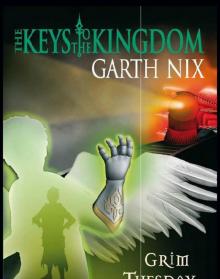 Grim Tuesday
Grim Tuesday Sabriel
Sabriel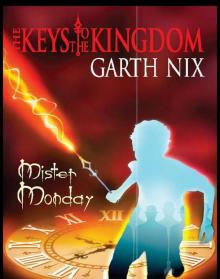 Mister Monday
Mister Monday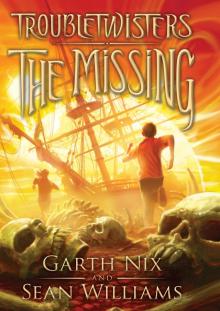 The Missing
The Missing The Fall
The Fall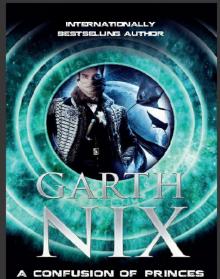 A Confusion of Princes
A Confusion of Princes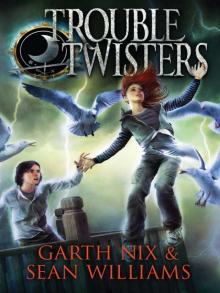 Troubletwisters
Troubletwisters Lirael
Lirael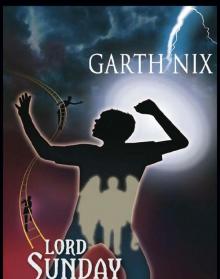 Lord Sunday
Lord Sunday Clariel
Clariel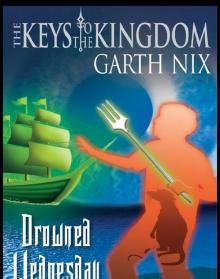 Drowned Wednesday
Drowned Wednesday Shade's Children
Shade's Children The Violet Keystone
The Violet Keystone Abhorsen
Abhorsen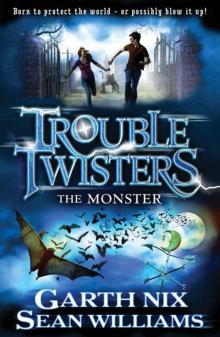 The Monster
The Monster The Creature in the Case
The Creature in the Case To Hold the Bridge
To Hold the Bridge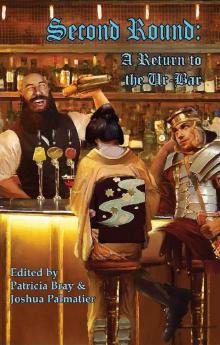 Second Round: A Return to the Ur-Bar
Second Round: A Return to the Ur-Bar Above the Veil
Above the Veil Aenir
Aenir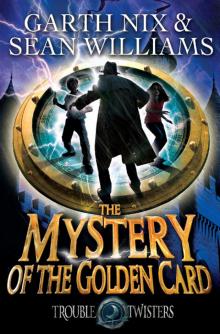 Mystery of the Golden Card
Mystery of the Golden Card Superior Saturday
Superior Saturday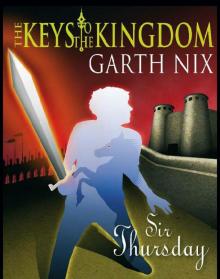 Sir Thursday
Sir Thursday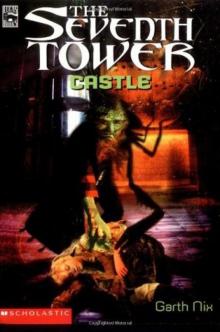 Castle
Castle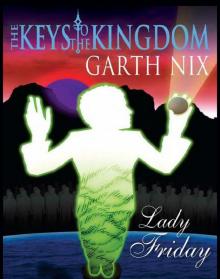 Lady Friday
Lady Friday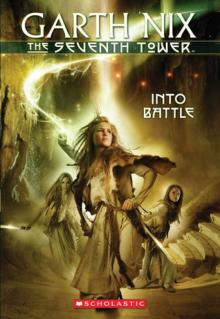 Into Battle
Into Battle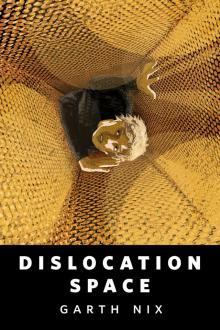 Dislocation Space
Dislocation Space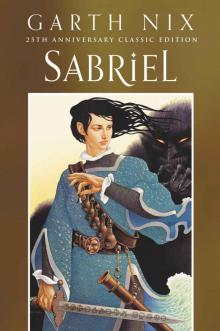 Sabriel (Old Kingdom Book 1)
Sabriel (Old Kingdom Book 1) Sir Hereward and Mister Fitz Go to War Again shamf-1
Sir Hereward and Mister Fitz Go to War Again shamf-1 The Left-Handed Booksellers of London
The Left-Handed Booksellers of London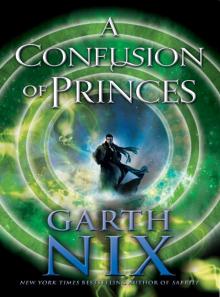 Novel - A Confusion of Princes
Novel - A Confusion of Princes One Beastly Beast
One Beastly Beast A Suitable Present for a Sorcerous Puppet shamf-3
A Suitable Present for a Sorcerous Puppet shamf-3 Beyond the Sea Gates of the Scholar Pirates of Sarsköe shamf-2
Beyond the Sea Gates of the Scholar Pirates of Sarsköe shamf-2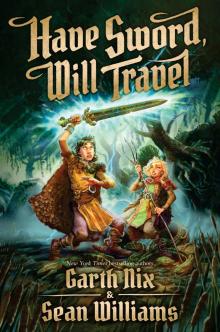 Have Sword, Will Travel
Have Sword, Will Travel Fire Above, Fire Below
Fire Above, Fire Below Nicholas Sayre and the Creature in the Case
Nicholas Sayre and the Creature in the Case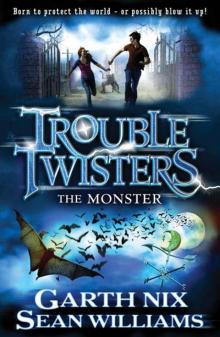 The Monster (Troubletwisters)
The Monster (Troubletwisters)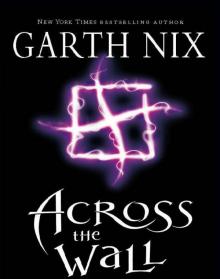 Across the Wall
Across the Wall Let Sleeping Dragons Lie
Let Sleeping Dragons Lie![[Abhorsen 03a] - Across the Wall Read online](http://i1.bookreadfree.com/i2/04/12/abhorsen_03a_-_across_the_wall_preview.jpg) [Abhorsen 03a] - Across the Wall
[Abhorsen 03a] - Across the Wall